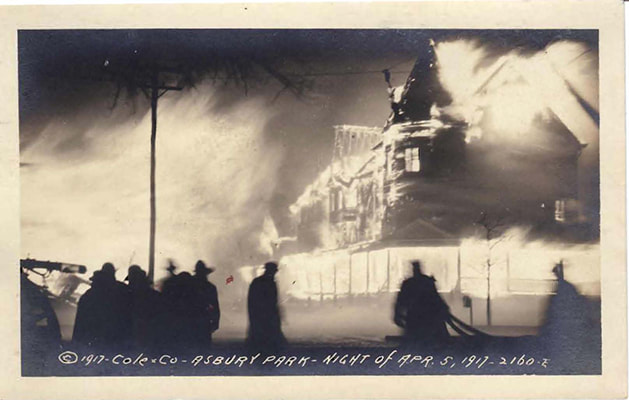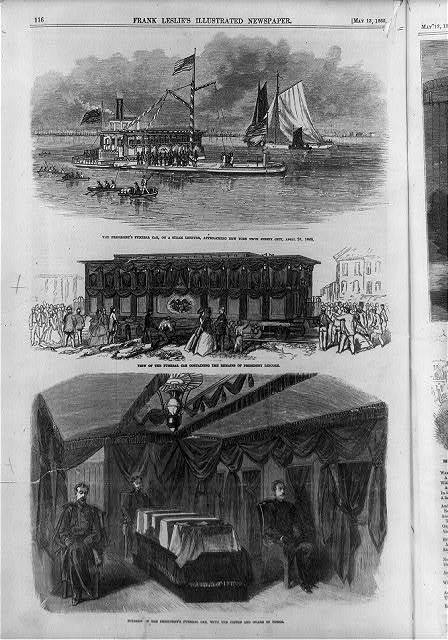* Home
|
-- New Jersey History Timeline - April
* January * February * March * April * May * June * July * August * September * October * November * December 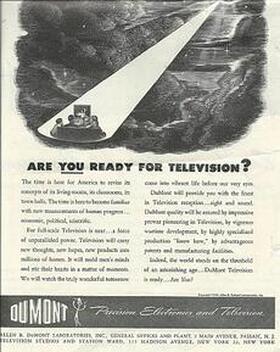
On April 1 of 1939 DuMont Laboratories, which electronics engineer Allen DuMont founded in the basement of his home in Upper Montclair, is licensed to begin experimental telecasts. The station later became WABD, channel 5. On April 2 of 1865
Confederate forces of the Army of Northern Virginia under Robert E. Lee are forced to abandon defense of Richmond after defeat in Battle of Petersburg by Union troops under Ulysses S. Grant, with First and Second New Jersey Brigades active in the fighting. On April 3 of 1936
Bruno Richard Hauptmann, convicted of the kidnapping in March 1932 leading to the death of the 20-month-old son of famed aviator Charles Lindbergh and his wife Anne Morrow Lindbergh, is executed in the electric chair at Trenton State Prison. 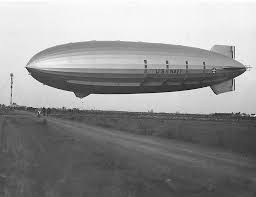
On April 4 of 1933
The airship USS Akron crashes during a storm n the Atlantic after taking off from the Lakehurst naval air station, killing 73 of the 76 men on board. Two additional men were killed when a Navy rescue blimp also crashes. The Akron crash was the deadliest airship disaster in history, surpassing the 36 fatalities of the May 1937 crash and fire of the German zeppelin Hindenburg when it attempted to land at Lakehurst. On April 5 of 2024
An earthquake measured at 4.8 on the Richter Scale centered in Hunterdon County impacts wide areas of New Jersey, New York City and Long Island, and parts of Delaware, Maryland, Connecticut and Massachusetts felt by more than 42 million people. In the following days, a series of weaker aftershocks occurred throughout the state The quake is the strongest to hit New Jersey in some 240 years according to geologists. On April 5 of 1917
A fire which began at the recently constructed Hotel Natatorium in Asbury Park spreads rapidly as it is driven by winds reaching 65 miles per hour. Across four blocks 20 hotels, two stone buildings, six garages, 16 cottages, two theaters, and a church were destroyed. On April 6 of 1938
Dr. Roy Plunkett, a scientist working at the DuPont laboratory in Jackson,while experimenting with refrigerants, accidentally discovers what would later be marketed as Teflon, a slippery substance widely used in non-stick cooking pans, various industrial and military applications, electrical wire insulation and stain repellants in fabrics. On April 7 of 2010
During a heat wave affecting the entire Northeast, Newark shatters its daily record for April 7 by seven degrees when the maximum temperature reaches 92 degrees. 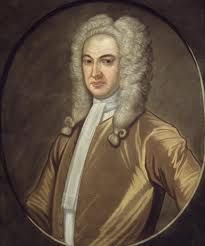
On April 8 of 1665
Royal Governor Richard Nicolls signs grants to colonists from New England and New York known as the Monmouth Patent for lands including what is now Monmouth County and parts of Middlesex and Ocean Counties. Disputes over the validity of the grants would cloud titles to the properties for many years. On April 9 of 1898
Paul Leroy Robeson is born in Princeton. In 1915, Robeson won an academic scholarship to Rutgers College, where he was twice named a consensus All-American in football and was the class valedictorian. He received his law degree from Columbia Law School, but after graduation was unable to secure jobs with major law firms, and pursued a career as a prominent singer and actor. His political and social activism protesting racial discrimination and advocating for socialist policies provoked controversy and he spent years living in Europe and the Soviet Union. On April 10 of 1787 A group of New Jerseyans opposed to the return of Loyalists who had left the state issue 'A Petition Against the Return of Tories' 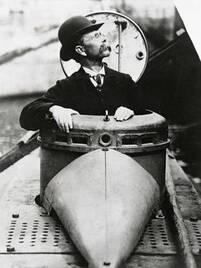
On April 11 of 1900
The US Navy acquires its first submarine, the USS Holland, named after its inventor, John P. Holland, an engineer and school teacher in Paterson. Holland had emigrated from Ireland in 1873, and developed the fist submarine able to travel underwater for a considerable distance and the first to combine electric motors for submerged travel and gasoline engines for use on the surface. Seven more of her type were ordered by the Navy, with five built at the Crescent Shipyard in Elizabeth, and two built in California. On April 12 of 2007
Governor Jon Corzine is severely injured when the SUV driven by a state trooper in which he was a passenger loses control and crashes into a guardrail. His injuries, which required multiple surgeries and weeks of rehabilitation, included a fractured left leg, sternum, collarbone, six ribs on each side and a lower vertebra. The Governor was on his way to a meeting at the Governor's Mansion in Princeton with radio personality Don Imus and the Rutgers women's basketball team after the controversy provoked when Imus referred to the team as "nappy-headed hoes" on his CBS radio show. Shortly before the scheduled meeting, CBS announced that it had fired Imus. On April 12 of 2020 Police find 17 bodies stacked in a makeshift morgue at a nursing home in Andover, Sussex County, sparking calls for more steps to protect residents of long-term care facilities from the COVID-19 virus. Additional actions include deployment of National Guard members to state veterans homes in Paramus and Menlo Park where dozens had died, and to assist at private nursing homes at various sites. On April 12 0f 1861
The Civil War begins as Fort Sumter in the port of Charleston, South Carolina, is attacked from cannons on the mainland. During the War, nearly 6,500 New Jersey soldiers lost their lives in action while fighting for the Union, with over 88,000 soldiers from New Jersey part of some 52 infantry and cavalry regiments, with 23,116 of those soldiers serving in the Army of the Potomac. Philip Kearny, an officer in the Mexican–American War, led a brigade of New Jersey regiments, distinguished himself for his leadership during the Peninsula Campaign and was promoted to the rank of major general. In the 1864 presidential election, President Lincoln was re-elected over former Army of the Potomac commander, George B. McClellan, who managed to win only three states: Kentucky, Delaware, and his home state of New Jersey. After the War, McClellan was elected as governor of New Jersey, serving a single three-year term from 1878 to 1881, As governor, McClellan worked to improve New Jersey’s transportation networks and also championed education and public health initiatives. On April 13 of 1777
A surprise attack conducted by 4,000 British and Hessian forces under the command of Lieutenant General Charles Cornwallis against a Continental Army outpost of 500 soldiers at Bound Brook leads to the British plundering the outpost, with estimates of Continental casualties ranging from 30 to 60 killed and 80 to 90 captured. Most of the 500-man garrison, however, is able to escape. 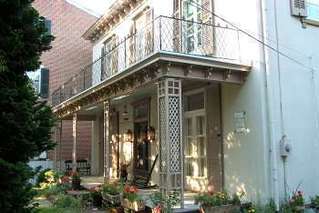
On April 14 of 1865
After declining President Lincoln's invitation to accompany him and his wife Mary Todd to the theater, General Ulysses S. Grant and his wife Julia take the train to the City of Burlington to visit their children at a house that Grant had rented for his family to reside in during the Civil War. Advised at their stop in Philadelphia that the President had been shot, the Grants continue on to Burlington, with Grant quickly returning to Washington on the following morning. 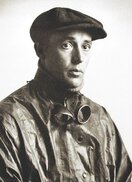 Washington Roebling II Washington Roebling II
On April 15 of 1912
The British passenger liner RMS Titanic sinks in the Atlantic after striking an iceberg on the previous night. Of the estimated 2,224 passengers and crew aboard,, more than 1,500 die. The 11 New Jersey residents who die include Washington Roebling II of Trenton, president of the Mercer Automobile Co. and the only son of Charles Roebling, president of John A. Roebling Sons, and the nephew and namesake of Colonel Washington A. Roebling, one of the builders of the Brooklyn Bridge designed by his father John A. Roebling. Roebling's close friend Stephen Blackwell, a Hopewell native who had toured Europe with Roebling visiting automobile factories, and the son of New Jersey State Senator John Blackwell, also died in the sinking..
On April 17 of 1907
Ellis Island processes 11,747 immigrants, the highest daily total in its history. During the year of 1907, a total of 1,004,756 persons arrived seeking entry to the US.
On April 18 of 1946 Jackie Robinson, the first African-American baseball player to play in the major leagues, makes his professional debut in a minor league game when his Montreal Royals played the Jersey City Giants before a capacity crowd at Roosevelt Stadium in Jersey City. Robinson had four hits (including a home run), four runs scored, drove in three, and stole two bases in the game won by Montreal 14 to 1. He led the International League in batting that year and won their Most Valuable Player Award. In the following year, he was called up to start the season with the Brooklyn Dodgers, making his major league debut as the first black player in the major leagues. On April 19 of 1991 Evander Holyfield successfully defends his heavyweight championship by a unanimous decision over former champion George Foreman in a fight at Boardwalk Hall in Atlantic City. It was then the highest-grossing boxing match of all time, generating approximately $55 million from pay-per-view tv buys and an additional $8 million from the live gate, with an estimated 19,000 fans attending. 
On April 20 of 1963
On what would become known as "Black Saturday," a series of fires in the Pinelands following a severe drought that started in the fall of 1962 result in seven deaths and over 180,000 acres burned. The fires are considered the worst in New Jersey's recorded history. 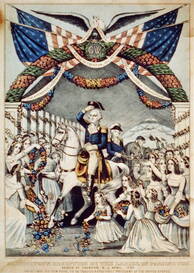
On April 21 of 1789 George Washington enters Trenton under a triumphal arch constructed in his honor on his way to New York to be inaugurated as the first president On April 22 of 1994
After suffering a stroke at his home in Park Ridge four days earlier, Richard M. Nixon dies at a hospital in New York City On April 23 of 1989
The Littlest Victims, a CBS-Television biographical drama about Dr. James Oleske, a physician practicing at the New Jersey Medical School in Newark, is broadcast. The film profiles Dr. Oleske's efforts to show that young children had contracted AIDS during the epidemic's early years when it was widely thought to be spread only though homosexual sex. Dr. Oleske faced widespread criticism from colleagues and the medical establishment such as the Centers for Disease Control until it was proven that he was correct that the disease also could be transmitted though blood transfusions. On April 24 of 1865
After stopping in Philadelphia on the previous night, the funeral train carrying the coffin of Abraham Lincoln crosses New Jersey, passing through Trenton, Princeton, New Brunswick, Metuchen, Rahway, Elizabeth and Newark. At Jersey City, the coffin is taken from the train and ferried across the Hudson to New York City Hall, where an estimated 100,000 line up to pass the coffin. 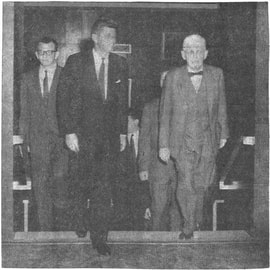
On April 25 of 1957
Massachusetts Senator John F. Kennedy addresses the graduating Class of 1957 of Princeton University, urging their participation in politics as "intellectuals...who deal with the truth, unlike politicians who deal in half-truths..." Kennedy had been a member of the Princeton Class of 1939, but dropped out in his freshman year as a result of a gastrointestinal illness, later graduating from Harvard as a member of its Class of 1940. 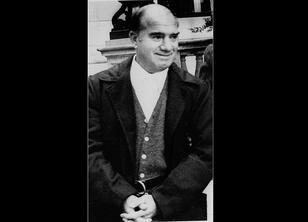
On April 26 of 1979
Anthony 'Little Pussy' Russo, the mob boss of Monmouth County, is shot and killed in Long Branch. Russo was home on an Easter furlough from state prison and shot in the head in a room at a Long Branch hotel. No one is ever charged for the murder, but the FBI believed that the hit was by others in the Genovese crime family to prevent Russo possibly testifying about the mob to a grand jury. 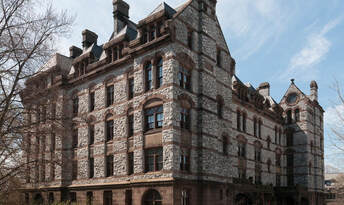
On April 27 of 1877
Witherspoon Hall is completed on the campus of the College of New Jersey (renamed Princeton University in 1896). It is the first dormitory in the nation to have indoor plumbing. On April 28 of 1942
The first state blackout during World War II takes effect as one of the measures to prevent potential enemy attacks on New Jersey. Other steps included civil defense patrols on beaches and other sites to detect submarines or landings of spies and saboteurs. On April 29 of 1992
Sidney Reso, an Exxon executive, is kidnapped from the driveway of his Morris Township home by Arthur Seale, a former Exxon security consultant who was fired by Exxon in 1987. Seale's wife Irene also assisted her husband in the kidnapping. Reso was shot in the arm, gagged, bound confined in a wooden box in a poorly ventilated storage space where he suffocated and died. The Seales were later arrested, tried, convicted and imprisoned. 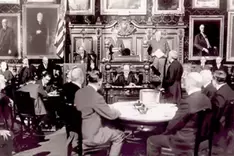
On April 30 of 1921 The Port Authority of New York (later renamed in 1972 as the Port Authority of New York and New Jersey) is created when representatives of New York And New Jersey sign a compact authorized by Congressional legislation in the Great Hall of the New York Chamber of Commerce in Lower Manhattan. * January * February * March * April * May * June * July * August * September * October * November * December 
|
